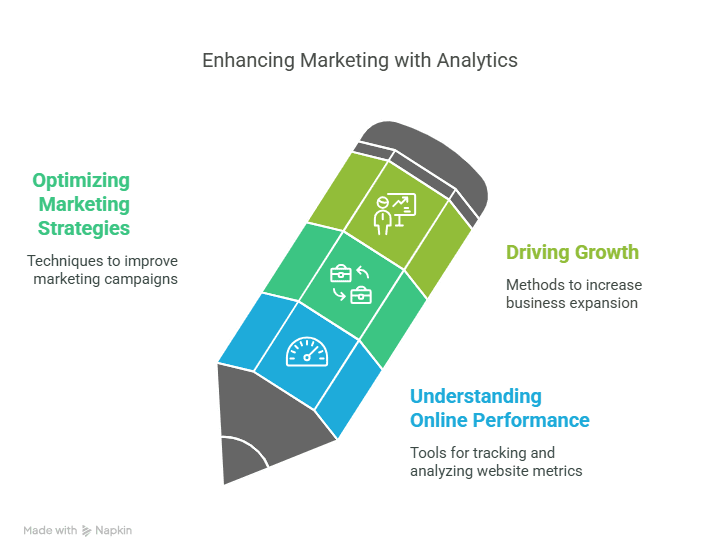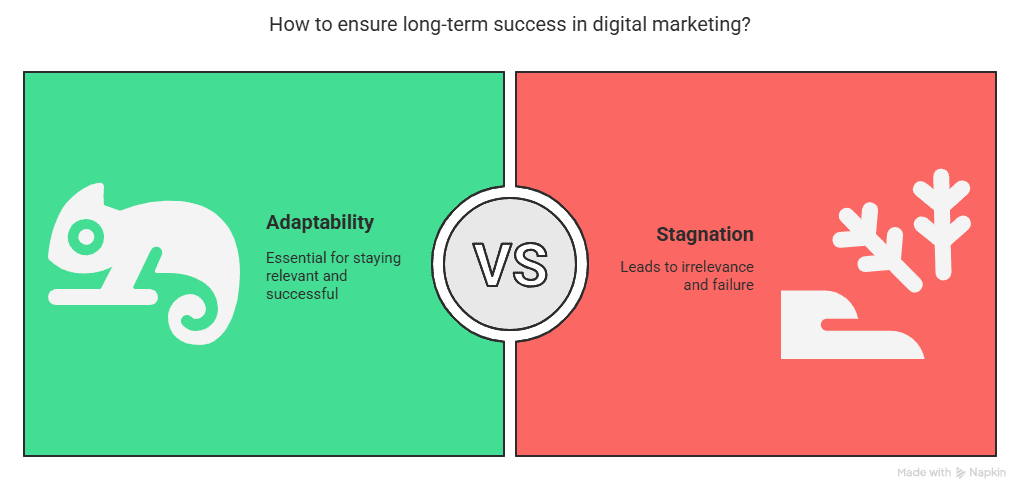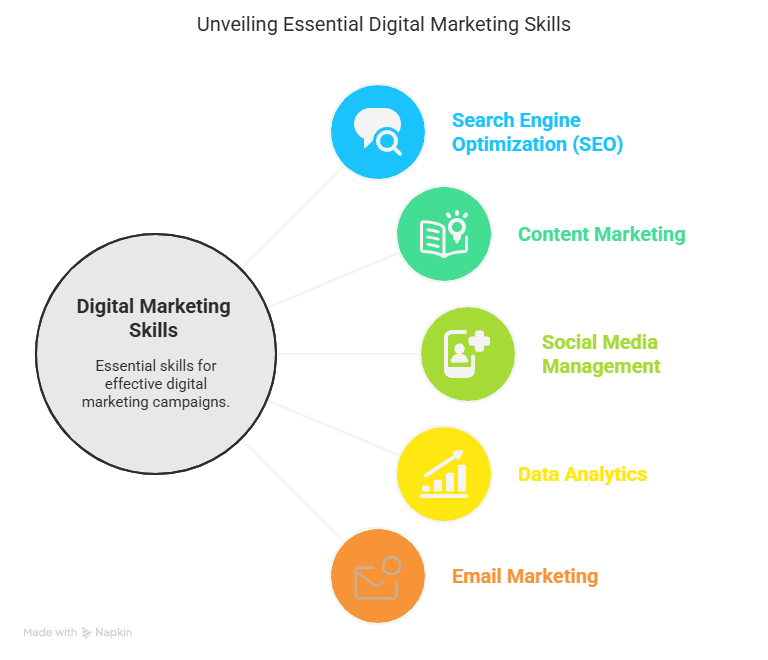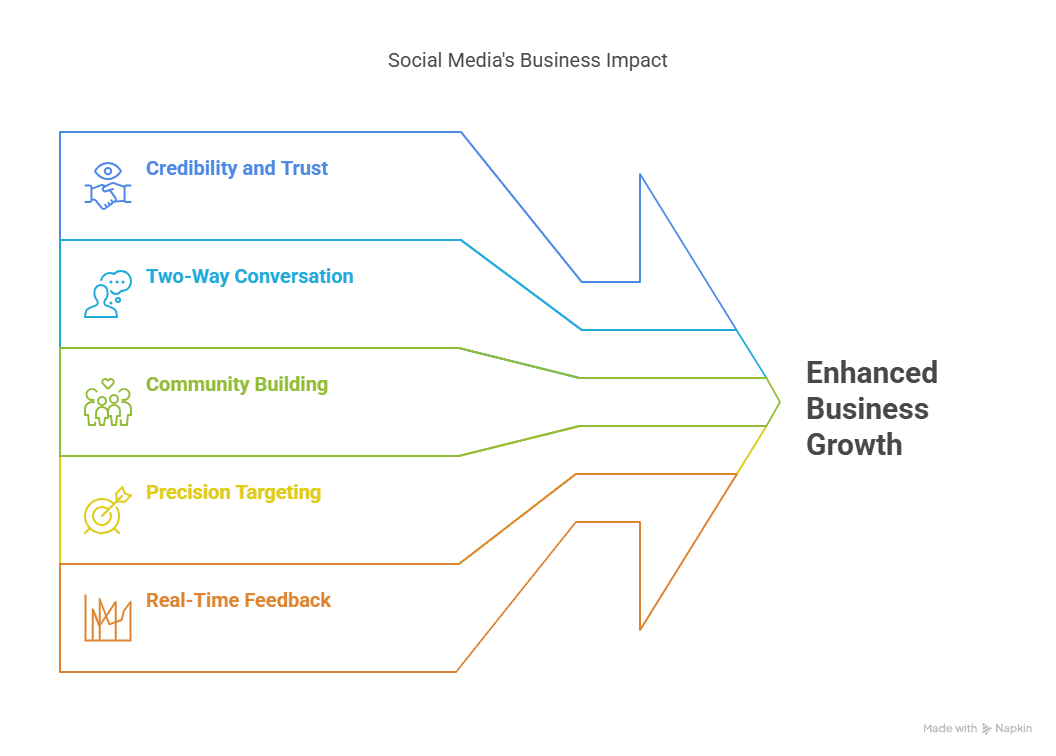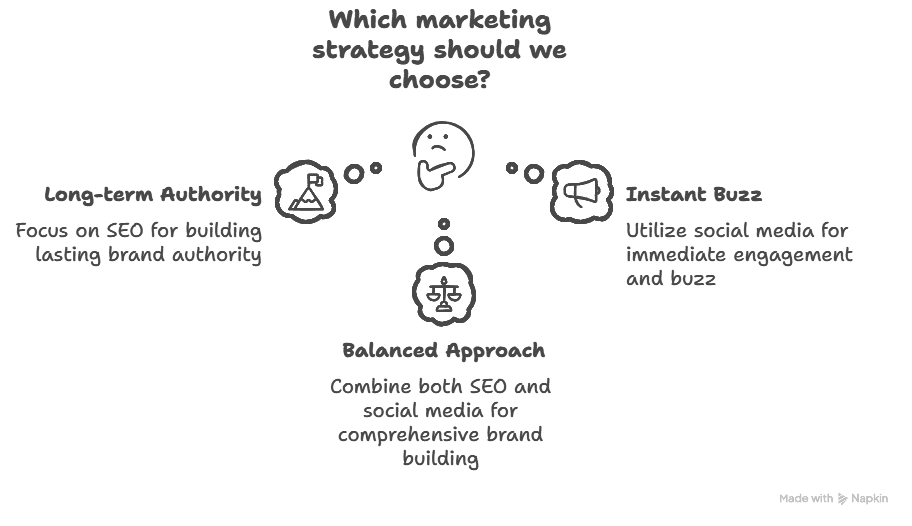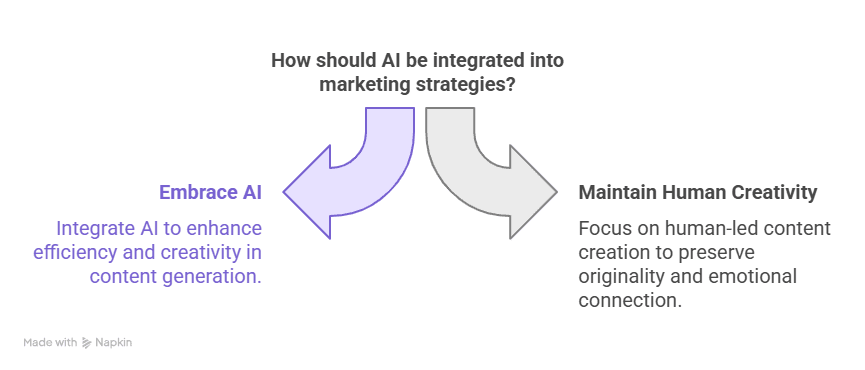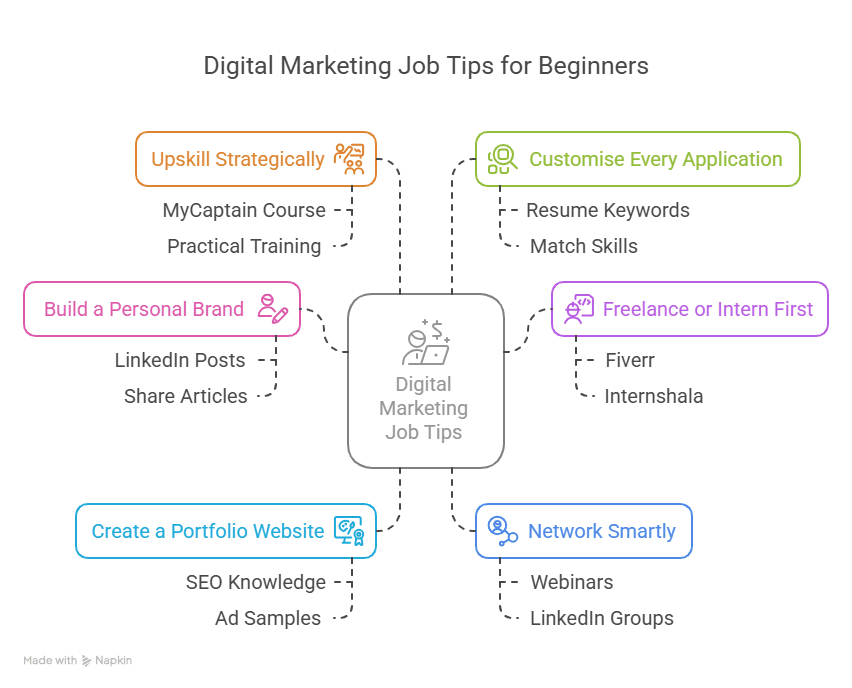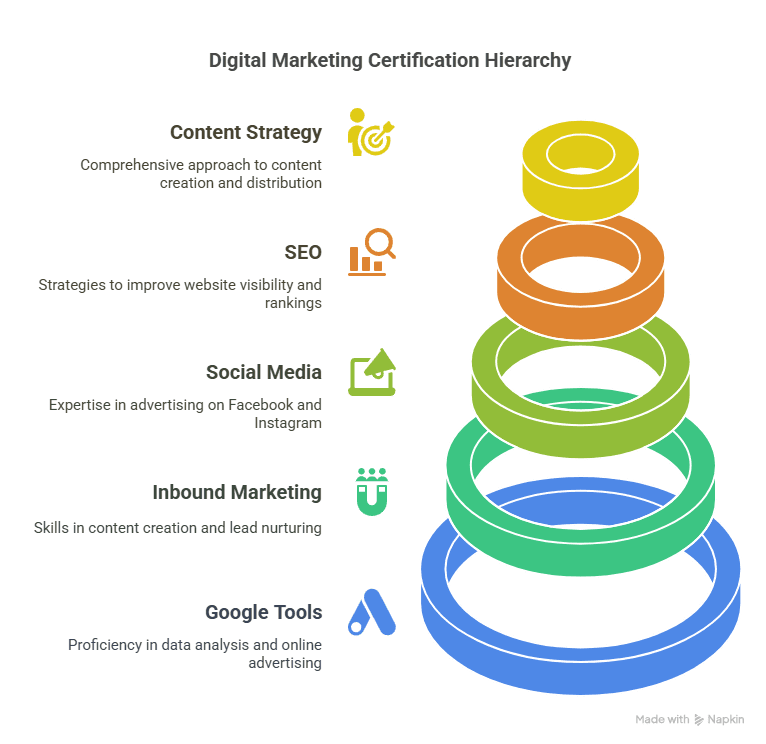Introduction
If you’re in the digital marketing space in India, you’ve probably asked yourself at least once: “Is this certificate going to pay off?” With course ads popping up everywhere and professionals flaunting their credentials on LinkedIn, the pressure to upskill and get certified is real. But here’s the million-rupee question — does it really impact your digital marketing salary?
In this blog, we dive deep into the numbers, trends, and insights that reveal whether certifications genuinely lead to a digital marketing salary boost. We’ll also explore the most recognised credentials, what employers value, and how to choose the right path for you.
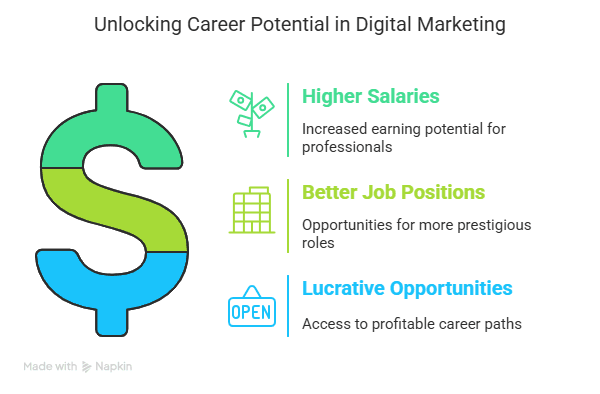
Table of Contents
- The Rise of Digital Marketing in India
- Marketing Certification Impact on Career Growth
- How Salary Increase with Certification Works
- Table: Pre- and Post-Certification Salaries in India
- Exploring the Best Digital Marketing Certs in 2025
- Is the Certified Digital Marketer Salary Worth It?
- Real Impact: Certifications that Raise Pay
- Digital Marketing Cert Salary Boost Factors
- Choosing the Right Certifications for Higher Pay
- Conclusion
- FAQs
- Key Takeaways
The Rise of Digital Marketing in India
India’s digital economy is booming. With over 800 million internet users and brands shifting major budgets online, there’s a massive demand for skilled digital marketers. As a result, the digital marketing salary landscape has seen considerable evolution over the past decade.
Entry-level salaries have become more structured, and mid-level professionals with certifications are commanding far better pay. According to a report by Naukri, certified digital marketers earn up to 30% more than their non-certified peers.
Marketing Certification Impact on Career Growth
A common question among aspirants is whether a marketing certificate carries weight in hiring decisions. The answer: absolutely, if it’s from the right provider. Recruiters often use certifications as a filtering mechanism, especially for entry and mid-level roles.
Beyond hiring, the marketing certification impact is also visible in how quickly professionals climb the career ladder. A certificate signals initiative, updated skills, and domain knowledge, making you a more attractive candidate for promotions.
How Salary Increase with Certification Works
So, how does a simple piece of paper translate to a fatter paycheck? There are several mechanisms behind the salary increase with certification. First, certified professionals are seen as more job-ready, which can shorten the training curve for employers.
Secondly, many companies have structured salary tiers linked to skill levels. Earning a recognised certification can unlock higher bands, especially in performance-driven environments.
Pre- and Post-Certification Salaries in India
Here’s a quick comparison of average monthly salaries based on digital marketing experience and certification status:
| Experience Level | Without Certification | With Certification |
| 0-1 Years (Fresher) | ₹18,000 – ₹25,000 | ₹28,000 – ₹35,000 |
| 1-3 Years (Associate) | ₹30,000 – ₹45,000 | ₹45,000 – ₹60,000 |
| 3-5 Years (Specialist) | ₹50,000 – ₹70,000 | ₹70,000 – ₹90,000 |
| 5+ Years (Manager) | ₹80,000 – ₹1,20,000 | ₹1,20,000 – ₹1,80,000 |
As you can see, a credible certificate can significantly boost your digital marketing salary prospects.
Exploring the Best Digital Marketing Certs in 2025
Choosing the right credential is half the battle. In 2025, the best digital marketing certs include options that combine technical skill-building with industry recognition.
Top Recommended Certifications:
- Google Digital Marketing Certification
- Meta (Facebook) Blueprint Certification
- HubSpot Inbound Marketing Certification
- Imarticus Learning’s Postgraduate Program
The best digital marketing certs offer hands-on training, placement support, and real-time project work, which dramatically improve your market value.
Is the Certified Digital Marketer Salary Worth It?
Yes — but only when the certification is recognised and the skills are applied. Many professionals get certified and stop there. However, those who go on to apply the learning — through freelancing, internships, or real-world projects — see the most growth in their certified digital marketer salary.
It’s also important to match certifications with your career goals. SEO specialists, paid media professionals, and marketing analysts all require different learning paths. The closer your certification is to your chosen niche, the more your digital marketing salary reflects it.
Real Impact: Certifications that Raise Pay
Let’s be honest — not all certificates are created equal. Employers have grown savvy and now value depth over volume. The certifications that raise pay are often:
- Endorsed by reputed institutes
- Taught by industry professionals
- Focused on in-demand skills like data analytics, SEO, and paid media
- Project-based with real outcomes
- Backed by placement support
Adding just one of these to your resume can tip the scale during interviews and appraisals.
Digital Marketing Cert Salary Boost Factors
Here’s what actually leads to a digital marketing cert salary boost:
- Certification from a globally or nationally recognised institution
- Practical experience via projects or internships
- Active use of learned tools (Google Ads, Meta Ads Manager, SEMrush, etc.)
- Ability to demonstrate ROI in past campaigns
- Continuous learning — stacking multiple niche certificates
- Industry network built through certified alumni or cohort groups
- Case study or capstone project presentation in interviews
When these factors align, your digital marketing salary can scale faster than average industry growth.
Choosing the Right Certifications for Higher Pay
With hundreds of courses out there, it’s easy to get overwhelmed. But your focus should remain on certifications for higher pay, not just for a fancy certificate to display on LinkedIn.
Use this checklist:
- Does it offer placement or career support?
- Are instructors industry leaders or generalists?
- Will you work on real-world marketing projects?
- Is the syllabus updated with current tools and platforms?
Avoid spending on certifications that don’t deliver tangible ROI in the form of improved digital marketing salary or skill relevance.
Conclusion
To wrap it up — yes, certifications do help improve your digital marketing salary, but the value you extract depends on what you choose and how you apply it. The digital marketing world rewards those who constantly upgrade, experiment, and perform. Certification is simply a stepping stone in that journey.
So, if you’re eyeing a salary jump, a promotion, or better opportunities abroad, investing in the right course might be your smartest move yet.
Key Takeaways
- Certifications help improve your visibility and hireability.
- Average salary hike ranges between 20%–50% depending on the cert.
- Hands-on experience multiplies the certification’s value.
- Focus on industry-recognised certifications with placement support.
- Never rely solely on certification — keep applying and growing.
FAQs
1. Can a digital marketing certification help me land a job faster?
Yes! a certification can make you stand out in a crowded job market, especially at the entry level – by showing employers that you’re proactive about upskilling.
2. What is the average salary hike after getting certified?
On average- certified professionals report a 20–50% salary hike depending on their experience level and type of certification pursued.
3. Are free certifications like Google’s worth it?
Yes, especially for beginners. While they may not carry the same weight as paid, advanced certifications, they still show initiative and basic knowledge.
4. Should I get certified in SEO, SEM, or Social Media?
It depends on your interest and career goals. Certifications in any of these can positively influence your digital marketing salary when aligned with your job role.
5. Do Indian employers value international certifications?
Absolutely. Certifications from Google, Meta, or international institutions are often seen as strong indicators of capability.
6. Can I get a salary hike without changing jobs?
Yes, many employers offer internal promotions or appraisals when you add new skills or certifications to your resume.
7. How long does it take to complete a good certification?
Most reputed digital marketing programs take 3–6 months, including project work, and can be done part-time.
8. Is it worth investing in expensive certifications?
Yes, provided they offer: hands-on learning, placement support, and mentorship from industry leaders.
9. Do I need a certification if I already have a marketing degree?
A degree gives you theoretical knowledge. Certifications provide hands-on, job-ready skills that can accelerate your salary and career growth.
10. Can I pursue digital marketing certifications while working full time?
Yes. Most courses are online & flexible- allowing you to learn after work hours or on weekends.
External Sources:

